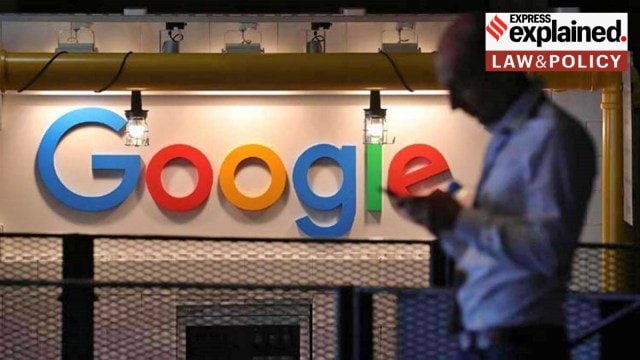Explained: The US antitrust ruling against Google and its implications for India
The US Justice Department and several states had sued Google for illegally cementing its dominance, in part, by annually paying the likes of Apple and Samsung billions of dollars to have Google automatically handle search queries on smartphones and web browsers.
 The Bill imposes restrictions on SSDEs, including barring them from favoring their own products and services, and barring them from using or sharing users’ personal data without their consent.
The Bill imposes restrictions on SSDEs, including barring them from favoring their own products and services, and barring them from using or sharing users’ personal data without their consent.
“Google is a monopolist, and it has acted as one to maintain its monopoly,” Judge Amit Mehta of the US District Court of Columbia said in a landmark verdict on Monday (August 5). He held that tech giant Google violated antitrust laws to maintain a monopoly over “general search services” and “general search text ads” (ads that appear at the top of a search results page).
The Justice Department and several states had sued Google for illegally cementing its dominance, in part, by annually paying the likes of Apple and Samsung billions of dollars to have Google automatically handle search queries on smartphones and web browsers.
 In India too, Google has faced allegations of anti-competitive practices. On Monday, the Alliance of Digital India Foundation (ADIF) filed a complaint claiming that Google has indulged in anti-competitive practices in the online advertising market. How does — if at all — the US verdict impact the ongoing litigation in India?
In India too, Google has faced allegations of anti-competitive practices. On Monday, the Alliance of Digital India Foundation (ADIF) filed a complaint claiming that Google has indulged in anti-competitive practices in the online advertising market. How does — if at all — the US verdict impact the ongoing litigation in India?
Different market conditions
Key to Justice Mehta’s ruling is Google’s position as the “default” search engine. Mehta called this “default distribution” a “major, largely unseen advantage over its rivals”. He said: “Most users access a general search engine through a browser (like Apple’s Safari) or a search widget that comes preloaded on a mobile device. Those search access points are preset with a “default” search engine. The default is extremely valuable real estate. Because many users simply stick to searching with the default, Google receives billions of queries every day through those access points.”
However, the judgment limits itself to the “relevant geographic market” of the United States. The market conditions for default browsers in India could weigh on the scales differently.
For instance, currently Xiaomi holds the largest market share (19.3%) in the mobile phone market according to a report by CyberMedia Research. Xiaomi phones, however, have the Opera browser and search function pre-installed.
Moreover, in October 2022, the Competition Commission of India (CCI) — which decides disputes relating to practices that may harm competition in Indian markets — imposed a monetary penalty of Rs 1337.76 Crores on Google. It held that mandatory pre-installation of the Google Mobile Suite (Google Search, YouTube, GMail, etc.) on Android devices with no option to uninstall the apps is an abuse of Google’s dominant position in the market. Following this verdict, Google announced that it would allow Indian users to choose a default search engine of their choice.
Competition Bill’s ‘solution’
Judge Mehta ruled that a consequence of Google’s position as the default General Search Engine (GSE) is that it now operates at a scale that disincentivises competitors from emerging in the same space. He explains this uphill battle by illustrating what it would take for a company like Mozilla — which switched from Yahoo to Google as its GSE in 2017 — to walk away from Google.
“First, the new entrant would have to surmount the entry barriers to create a GSE of comparable quality to Google”, he said. These barriers would include high capital costs, access to distribution channels, and brand recognition.
“Second, it would have to build an ads platform that could monetise search on par with Google. Third, it would have to promise to offset any revenue shortfall that might arise either from reduced query volume (because some users would elect to stay with Google) or from inferior ad monetisation (because fewer users could mean fewer advertisers and less profitable ad auctions, notwithstanding the quality of its delivery of ads). A new entrant would need billions of dollars to meet these three conditions,” he said.
The Ministry of Corporate Affairs released the Draft Competition Bill, 2024, in March which is geared towards preventing tech companies of this scale — termed Systemically Significant Digital Enterprises (SSDEs) — from participating in anti-competitive practices.
The Bill imposes restrictions on SSDEs, including barring them from favoring their own products and services, and barring them from using or sharing users’ personal data without their consent.
Big tech companies have objected to the Bill, saying that it imposes significant compliance burdens on them which would shift focus from innovation and research to pre-emptively ensuring that companies do not engage in anti-competitive practices.
Some experts in the field, such as National Law School Associate Professor Rahul Singh, believe that the Bill could have ramifications beyond what was intended. “Unwittingly, it (the Bill) will also capture and target some Indian tech companies like Zomato, Swiggy or BigBasket…it will harm the innovation which is going on domestically”, he said.






































